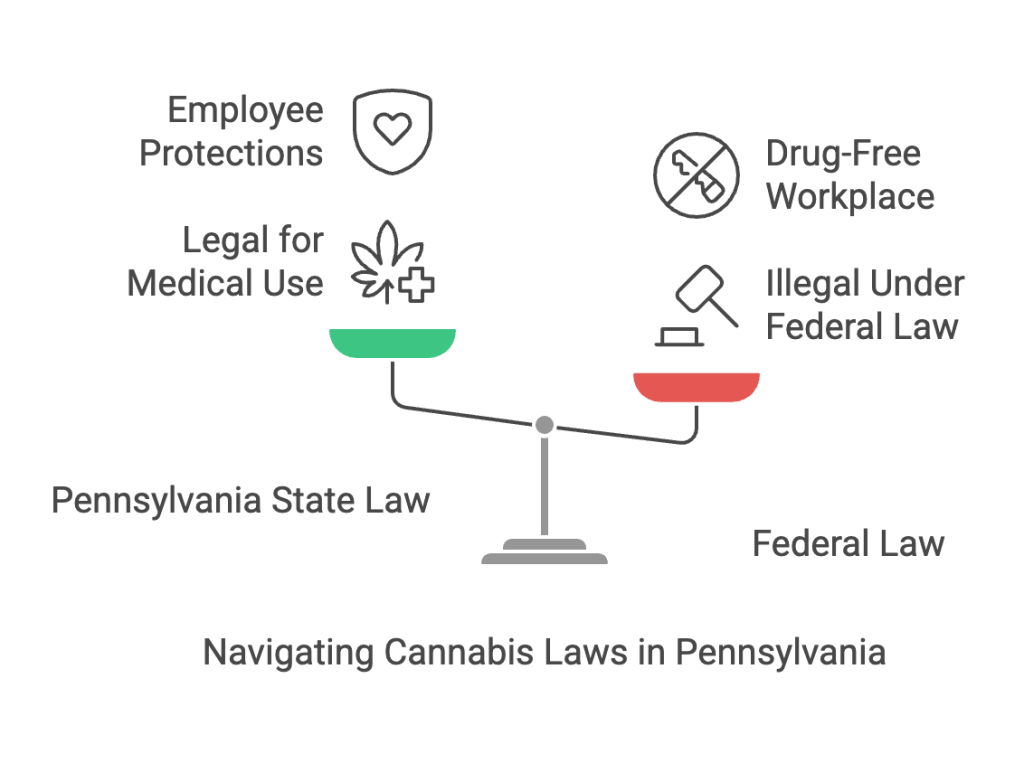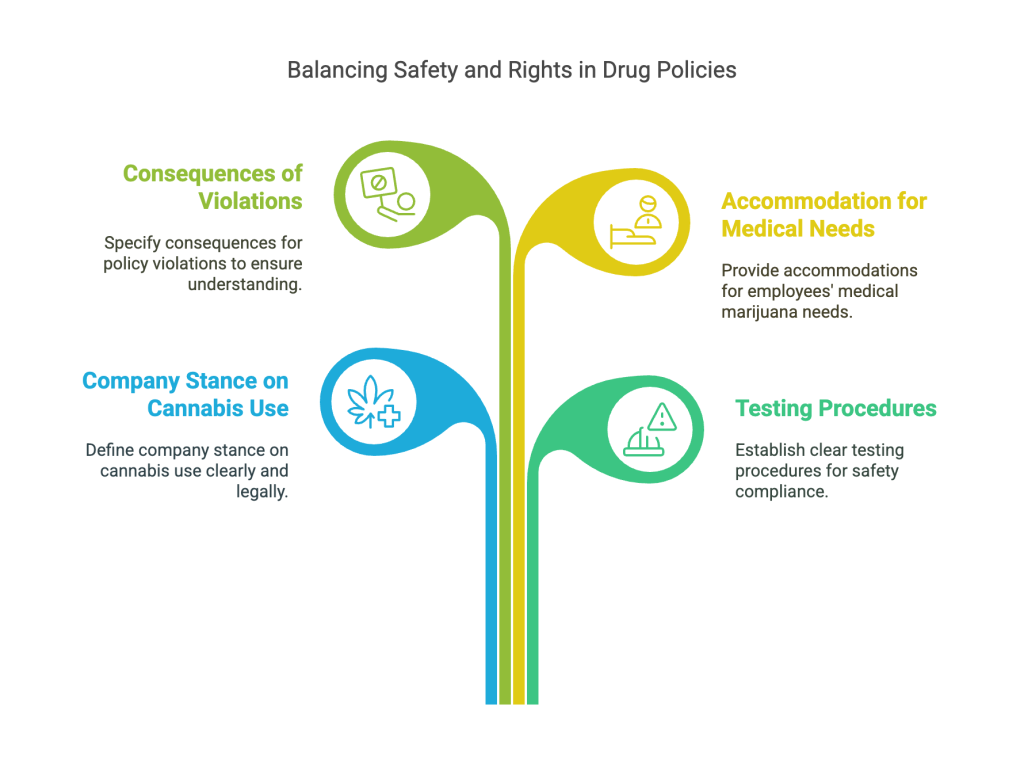Navigating the evolving landscape of cannabis employment laws can be a daunting task for both employers and employees in Pennsylvania. With the legalization of medical marijuana and varying attitudes towards cannabis use, understanding your rights and responsibilities becomes crucial. This guide aims to demystify Pennsylvania cannabis employment checks, including how medical marijuana affects hiring practices and the role of THC testing in employment.
Key Takeaways
- Cannabis use in Pennsylvania complicates employment due to contrasting state and federal regulations.
- Employers must adjust policies to accommodate legalized medical marijuana while maintaining a drug-free workplace.
- Employees should understand their rights and obligations, especially when working in federally regulated industries.
- The Palmiter v. Commonwealth Health Systems case highlights legal protections for medical marijuana users in Pennsylvania.
- Clear communication and updated workplace policies can help minimize conflicts and ensure compliance with evolving cannabis laws.
Introduction
Cannabis use complicates employment in Pennsylvania. With medical marijuana legalized, understanding its impact on hiring and employment practices is necessary. Employers and employees both face a mix of state and federal regulations, creating a complex environment. This guide offers clarity for both perspectives in Pennsylvania's legal landscape.
Legal Framework Surrounding Cannabis Use in Pennsylvania
Pennsylvania's medical marijuana laws are fairly new, having been enacted in 2016. This law allows individuals with certain medical conditions to use cannabis with a physician-issued certification. Conditions include serious ones like cancer, epilepsy, and PTSD, among others. Importantly, patients must register with the state's medical marijuana program to have legal standing.

For employers, these laws mean adapting to a new set of rules regarding marijuana use. State law provides protections for medical marijuana users, stating that employers can't penalize employees solely for their medical marijuana status. Yet, this intersects with the need for a drug-free workplace, especially in safety-sensitive positions.
The tension between federal and state law further complicates matters. Federal law still classifies marijuana as a Schedule I drug, illegal under any circumstances. This disparity can impact employment decisions, particularly in industries that follow federal regulations like transportation and defense.
Employers and employees must navigate these waters carefully. Employers should update policies to reflect state laws while maintaining federal compliance. Employees need to understand their rights under state law and the potential consequences under federal guidelines. Are you fully aware of how these differing laws might affect your work situation? Understanding both the protections and limitations in place can help you make informed decisions in a landscape that is still evolving.
PA Medical Marijuana Hiring Practices
Employers in Pennsylvania are navigating a complex terrain when it comes to hiring individuals who use medical marijuana. If you're an employer, understanding the law and adopting clear policies can save a lot of headaches. Start by recognizing that medical marijuana is legal in Pennsylvania. This means qualifying patients holding a valid medical marijuana card are legally allowed to use cannabis for medical reasons. However, federal law still classifies marijuana as illegal. This discrepancy can create legal challenges in the employment process.
For employers, it’s crucial to consider whether a role falls under federal jurisdiction. Positions governed by federal law, such as those involving transportation or aviation, may still require adherence to federal drug-free workplace guidelines. For other positions, you'll need to weigh the potential risks and benefits of employing medical marijuana users. Consider the specific needs of the role and whether any reasonable accommodations could support a medical marijuana-using employee without compromising workplace safety.
From the employee's perspective, understanding your rights is just as important. In Pennsylvania, state law offers certain protections. Employers cannot discriminate against you simply because you hold a medical marijuana card. However, you're expected to comply with drug use policies, especially if being impaired at work poses a safety risk. To protect yourself, keep documentation of your medical marijuana card and any relevant communication with employers about your usage.
A notable court case, Palmiter v. Commonwealth Health Systems, highlighted these issues. An employee was terminated after failing a drug test due to legal, off-duty medical marijuana use. The court ruled in favor of the employee, setting a precedent for employee protections in the state. This case underscores the importance for employers to craft policies that respect state law while ensuring workplace safety.
Are you taking steps to understand both the rights of employees and the obligations of employers? As the landscape evolves, staying informed and adaptable is crucial for compliant and fair employment practices in Pennsylvania.
THC Testing in Pennsylvania Employment
THC testing is a tool employers use to ensure workplace safety and adherence to company policies. These tests are usually done through urine or hair samples, screening for THC metabolites. But what drives employers to test for THC? Primarily, it's about ensuring employees can perform their duties without impairment. Especially in roles that demand high attention or involve safety-sensitive tasks, the stakes are significant.
The legal landscape around THC testing in Pennsylvania can be tricky. While medical marijuana is legal, no state law stops an employer from implementing drug-free policies. Some businesses, particularly those with federal contracts or safety-sensitive positions, might insist on zero tolerance. Yet, employees using medical marijuana under the state law have certain protections. An employer can't fire you solely because you're a registered medical marijuana patient. However, issues arise if your use impacts job performance or safety.
Employees often ask about their protections if they test positive for THC. In Pennsylvania, if you're using marijuana legally for medical purposes, employers must consider this situation carefully. You might be protected from employment actions like termination, but it largely depends on job duties and the specifics of company policy. Consult with HR or legal advisors if faced with THC-related employment issues, and stay informed about your rights and responsibilities.
Developing Employer Drug Policies in Pennsylvania
Creating a drug policy that respects medical marijuana use while maintaining a safe workplace is crucial but manageable. Start by clearly defining your company’s stance on cannabis use. Align it with both state laws and industry requirements.

State that while you support lawful medical marijuana use, safety remains critical. Explain how the policy applies to employees with medical marijuana prescriptions, focusing on job performance and safety-sensitive positions. Specify your stance: Will you accept medical marijuana use when off-duty or entirely prohibit it based on job requirements?
Outline your testing procedures. Describe who will be tested, under what circumstances, and how testing advances safety aims. Include the process for employees to verify valid medical marijuana authorization if they test positive. Clear instructions reduce legal risks and misunderstandings.
Define the consequences of policy violations. What happens if someone fails a test? Are there distinctions between off-duty use versus on-the-job impairment? Effective policies specify repercussions, ensuring employees understand the stakes.
Accommodation is key. Law requires reasonable adjustments for medical needs. Indicate how employees can request accommodation and the criteria for evaluating these requests. Clarifying this strengthens compliance and fosters mutual respect.
The goal is balance: prioritize safety while upholding employee rights under state law. A well-crafted policy is a practical strategy, not just a legal necessity.
Challenges and Best Practices
Ensuring compliance with Pennsylvania's cannabis employment laws presents various challenges. Both employers and employees often grapple with discrimination claims and inconsistent policy enforcement. For instance, an employer might unknowingly apply their drug policy unevenly across different departments, leading to grievances and potential legal liabilities. Clarity and consistency in policy application are crucial to prevent such issues.
For employers, staying ahead involves several best practices. Regular training on cannabis-related laws for HR and management is critical. This keeps everyone informed about current regulations and helps avoid discriminatory practices. Updating policies to reflect the evolving legal landscape is another must. Transparent communication with employees about how cannabis use might affect their job is essential. Clear guidelines help prevent misunderstandings and build trust.
Employees should also be proactive. It’s important to understand your rights concerning medical marijuana use. Disclosing your status to an employer can be tricky. Consider doing it before any positive test result to ensure transparency and safeguard your job. If workplace conflicts arise, addressing them directly and professionally, following your employer's grievance procedures, can resolve many issues. Understanding both policies and your rights fortifies your position and helps navigate potential conflicts.
Are you prepared to handle these scenarios and ensure compliance in your workplace? The answer lies in understanding the law, honing clear communication, and being proactive.
Conclusion
The landscape of cannabis-related employment laws in Pennsylvania presents both challenges and opportunities for employers and employees. On one hand, employers must navigate the complexities of accommodating medical marijuana use while ensuring workplace safety. On the other, employees who use medical marijuana have rights that need protection. Clarity is essential to avoid potential conflicts and ensure compliance.
A firm understanding of the legal framework can help both parties. At the state level, Pennsylvania's legalization of medical marijuana offers certain protections for employees, yet federal prohibition remains a factor, often complicating matters. Employers should develop clear drug policies, incorporating both state laws and the specific needs of their industry.
Effective communication is crucial. Employers should engage in open dialogue with employees, fostering a culture of trust and transparency. Employees, in turn, should approach conversations about medical marijuana use with honesty and preparedness, understanding their rights and the scope of their employment agreements.
Looking forward, legislative changes are expected. Staying informed about these developments will be crucial for both parties. Open lines of communication will ensure that policies remain relevant and respectful of both safety standards and individual rights.
The goal is shared: respect and clarity in navigating cannabis employment laws. Both employers and employees are encouraged to be proactive, informed, and communicative, paving the way for a harmonious and legally compliant workplace.
Additional Resources
When exploring Pennsylvania's cannabis employment laws, having access to the right resources can make a significant difference. Here's where you can deepen your understanding and find practical guidance.
- Pennsylvania Department of Health - Medical Marijuana Program: This is a crucial resource for understanding state guidelines on medical marijuana use. You can find forms, facts, and instructions on how to enroll in the program by visiting their official website.
- Pennsylvania Human Relations Commission: For those concerned about discrimination in the workplace related to medical marijuana use, this commission offers valuable insights on your rights and how to file complaints. More details are available at the PHRC website.
- National Organization for the Reform of Marijuana Laws (NORML): This organization provides updates on legislative changes and advocacy efforts related to marijuana laws. Their website is a good resource for staying informed about broader cannabis legislation trends.
- Society for Human Resource Management (SHRM): Employers can find guidelines and best practices for crafting workplace policies that align with current laws. The SHRM site offers resources tailored to human resource professionals.
- American Civil Liberties Union (ACLU) of Pennsylvania: They can offer support and guidance if you face legal issues concerning your cannabis use and employment. Information about their work and how to reach them can be found on their website.
Using these resources ensures you're both informed and prepared, whether you're an employer refining your drug policies or an employee asserting your rights.
Frequently Asked Questions (FAQs)
Can PA employers test for medical marijuana?
Yes, employers in Pennsylvania can test employees for marijuana use. However, they must keep in mind that medical marijuana is legal for patients with a qualifying medical condition and a valid medical marijuana ID.
Are cannabis prescriptions visible on PA background checks?
Cannabis prescriptions themselves are not part of a standard background check. However, other related issues, such as past marijuana convictions, might appear unless expunged.
Can you be fired for medical marijuana use in PA?
Yes, if your marijuana use affects your performance or safety at work. Employers can maintain a drug-free workplace and have policies regarding impairment and safety.
Do PA employers have to accommodate cannabis patients?
Employers are not required to accommodate employees using medical marijuana. They have the right to enforce drug-free policies, especially in safety-sensitive roles.
How to handle positive THC tests in Pennsylvania?
Communicate openly with your employer about your medical marijuana use. Provide documentation if required. Discuss potential accommodations if your role allows it.
Are safety-sensitive jobs exempt from PA cannabis laws?
Yes, those in safety-sensitive roles—like operating heavy machinery or emergency services—are often held to stricter standards regarding drug use.
Can dispensary workers fail background checks in PA?
Dispensary workers may fail background checks if they have disqualifying criminal convictions. It's important to understand the specific hiring criteria of the dispensary.
Does PA expunge past marijuana convictions?
Pennsylvania has processes in place for expunging or sealing certain marijuana convictions. Check with legal resources for eligibility and procedures.
Are out-of-state medical cards recognized in PA?
No, Pennsylvania does not recognize medical marijuana cards from other states. Patients must obtain a PA medical marijuana card.
How to update drug policies for PA cannabis laws?
Review and revise your company’s drug policies to clarify your stance on medical marijuana use. Consider consulting legal experts to ensure compliance with state laws.
Can medical marijuana use impact workers' compensation claims?
Yes, if marijuana use contributes to a workplace incident, it could affect workers' compensation claims. Employers might argue impairment at the time of the incident.
Are there specific industries particularly affected by medical marijuana laws in PA?
Industries like healthcare, transportation, and manufacturing may have more stringent requirements due to safety concerns and federal regulations.
What steps can you take if unfairly terminated for medical marijuana use in PA?
Consult an employment attorney to explore potential legal actions or settlements. It's key to understand your rights under state laws.
How does medical marijuana use affect unemployment benefits in PA?
Your eligibility might be affected if dismissed due to marijuana use violating company policy. Understanding the specifics of your situation is important.
Definitions
Medical Marijuana Card
A medical marijuana card is an official identification issued by the state of Pennsylvania that allows a person with a qualifying medical condition to legally purchase and use cannabis for medical purposes. To get one, you must be certified by an approved physician and registered with the state’s medical marijuana program. Holding this card gives you certain protections at the state level, but it does not exempt you from federal law restrictions.
Reasonable Accommodation
A reasonable accommodation is an adjustment an employer makes to help an employee with a medical condition perform essential job duties. In the context of medical marijuana, this could mean modifying schedules, reassigning tasks, or allowing off-duty use—so long as job safety and performance aren't at risk. Employers typically assess these requests based on the specific role, its safety sensitivity, and legal obligations.
Safety-Sensitive Position
A safety-sensitive position is a job where an employee’s impaired performance could seriously endanger themselves or others. This includes roles like commercial drivers, machine operators, and healthcare providers. For these positions, employers often enforce strict drug policies, even if the employee has a medical marijuana card, to comply with safety standards and possibly federal regulations.
THC Testing
THC testing is a screening process employers use to detect the presence of tetrahydrocannabinol, the main psychoactive compound in cannabis. Tests are usually done via urine or hair samples. Companies use THC testing to ensure employees can perform their roles safely, especially in regulated or high-risk industries. A positive test won’t automatically mean job loss, but context and job duties matter.
Discrimination
Discrimination in employment occurs when a worker is treated unfairly based on protected characteristics, which in Pennsylvania can include holding a medical marijuana card. For example, firing or not hiring someone solely because they are a registered patient could be considered discriminatory under state law. However, this doesn’t mean employees can be impaired while working. Employers can still take action if job performance or safety is compromised.
References
- https://www.weisbergcummings.com/employment-claims/medical-marijuana/laws-in-pa/
- https://www.kaufmanworkerscomp.com/post/a-primer-on-the-legal-rights-of-medical-marijuana-patients-in-pennsylvania
- https://www.naag.org/attorney-general-journal/the-effects-of-marijuana-legalization-on-employment-law/
- https://pmc.ncbi.nlm.nih.gov/articles/PMC6358421/
Still have questions?
Get in touch with our team today for a personalized demo and discover how our tailored volume pricing and packages can drive results for your business!
How useful was this page?*
Note: your comments are anonymous. We use them to improve the website. Do not include any personal details.
Visit our FCRA Compliance Tool or leave a message here if you need a response.
From the blog Explore the GCheck Content Hub

How to Perform OIG Exclusion Screening: Step-by-Step Guide
20 Nov, 2025 • 24 min read
Illinois Tenant Screening Laws: Chicago & Cook County Compliance Guide for Landlords
19 Nov, 2025 • 20 min read
FCRA Penalties for Small Businesses: 2025 Compliance Costs & Violation Fines
12 Nov, 2025 • 20 min readThe information provided in this article is for general informational and educational purposes only and should not be construed as legal advice or a substitute for consultation with qualified legal counsel. While we strive to ensure accuracy, employment screening laws and regulations—including but not limited to the Fair Credit Reporting Act (FCRA), Equal Employment Opportunity Commission (EEOC) guidelines, state and local ban-the-box laws, industry-specific requirements, and other applicable federal, state, and local statutes—are subject to frequent changes, varying interpretations, and jurisdiction-specific applications that may affect their implementation in your organization. Employers and screening decision-makers are solely responsible for ensuring their background check policies, procedures, and practices comply with all applicable laws and regulations relevant to their specific industry, location, and circumstances. We strongly recommend consulting with qualified employment law attorneys and compliance professionals before making hiring, tenant screening, or other decisions based on background check information.

